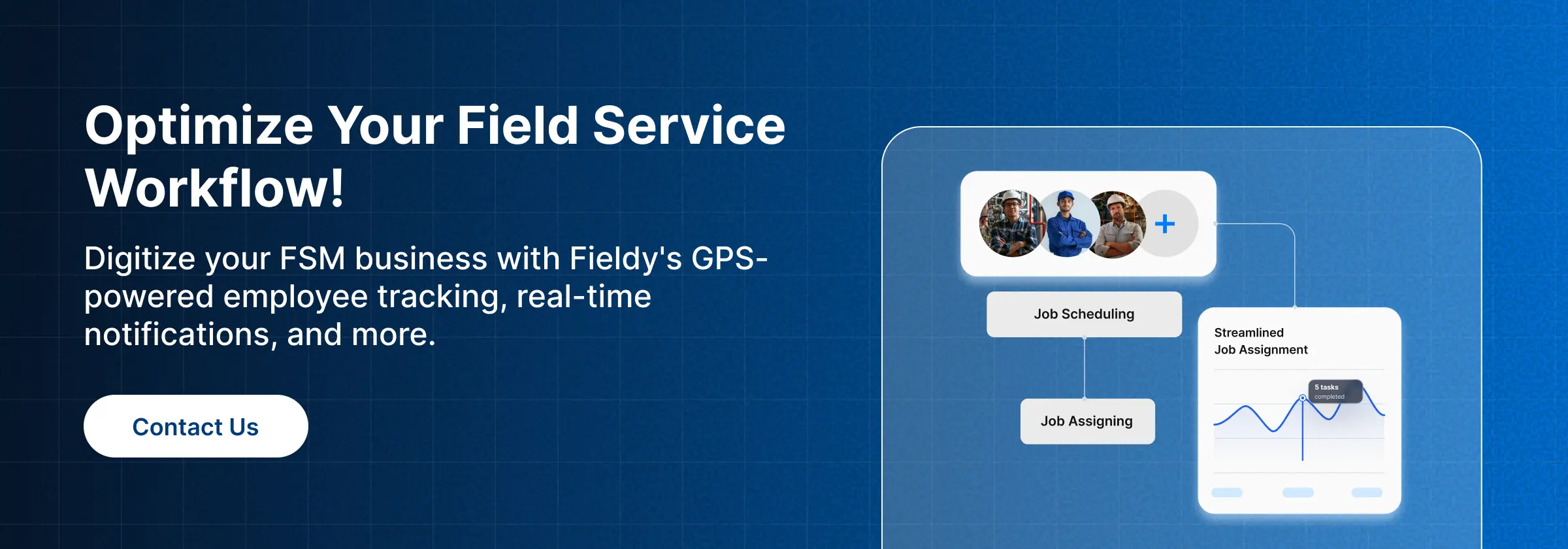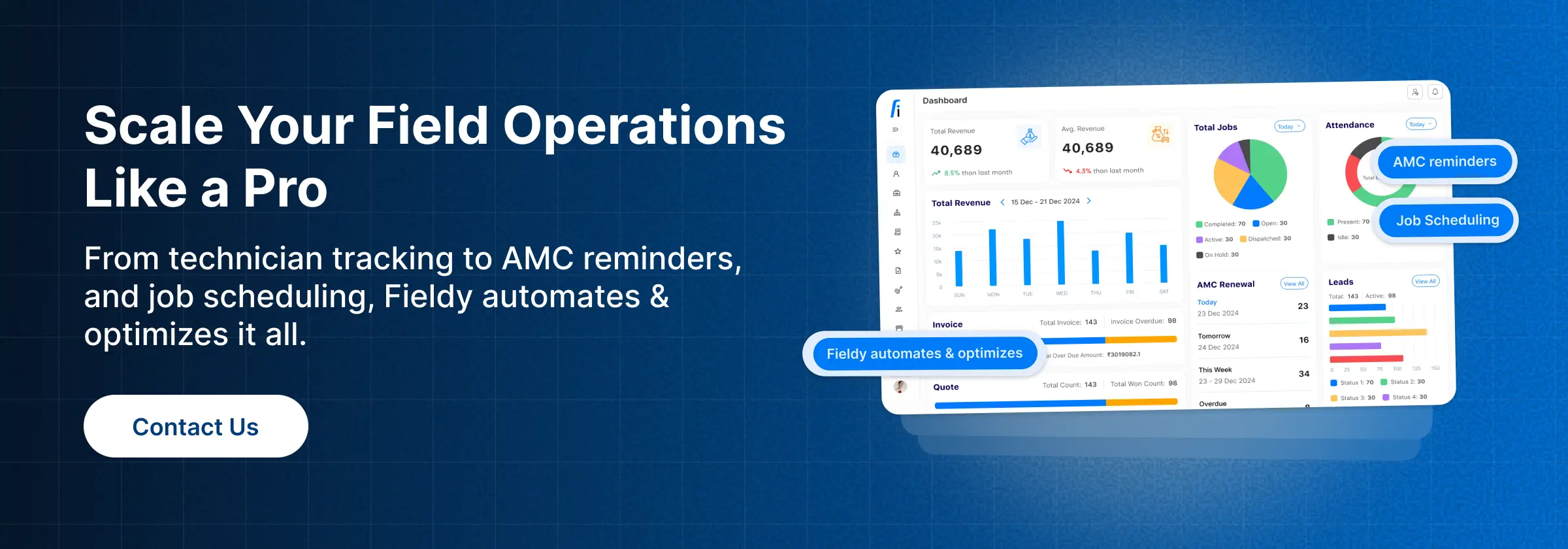⚙️ Introduction
Why Asset Management Matters in Field Service?
From HVAC and elevator maintenance to plumbing, pest control, and home security, field service companies consider physical assets to be the lifeblood of consistent service delivery. Such assets can span from special-purpose tools to safety harnesses to service vehicles and heavy-duty plants.
These are the risks a business might run with poor management of assets:
- May witness unanticipated downtimes causing service delays.
- Reduced operational efficiency, affecting work scheduling.
- Revenue losses due to unplanned repair costs, breach of SLAs, and churn.
A research paper by Aberdeen Group draws attention to how more than 80% of organizations witness unexpected equipment breakdown each year, equating to lost time for production and higher maintenance costs.
In the adaptation to avoid this, more companies are adopting asset management software, a 21st-century digital solution where equipment is tracked, monitored, and profiled for optimization at every stage of its lifecycle. Thus, installing needless disruptions and boosting profitability over time.
Field service providers looking at broader strategies can also explore what asset service management is and asset management solutions, which reveal how asset management software fits into the bigger service management ecosystem.
Instead of disruptions and inefficiencies, asset management software now looks set to provide a digital solution for 21st-century digital equipment tracking, monitoring, and profiling for optimization through every stage of the lifecycle. In so doing, unnecessary disruptions are installed, whereas profits are to some extent weighted.
🧭 What is Asset Management Software?
Definition💡: Asset Management Software (AMS) stands for a centralized digital platform that manages business-critical assets through their entire lifecycle, from acquisition, deployment, maintenance, and finally being retired.
An AMS provides a real-time view of the assets, unlike spreadsheets or manual logs, which are prone to human errors and duplications.
In field service systems 🛠️:
- The field technicians always have equipment ready.
- Service delays are kept to a minimum.
- Predictive maintenance sustains asset reliability.
- Managers use resources optimally with correct insights.
Insights 📈: Organizations deploying AMS claim savings of a maximum of 30% by avoiding repeated asset purchases, controlling unauthorized use of assets, and reducing asset losses. For larger enterprises, what enterprise asset management software is built on is the very foundation of providing more advanced functionality across multiple branches and regions.
🧩 Core Features of Asset Management Software in FSM
Centralized Asset Database 🗂️
A unified repository where every piece of equipment, tool, or vehicle is cataloged. This ensures all stakeholders, technicians, managers, and auditors work with a single source of truth.
Condition & Performance Tracking 📊
IoT-enabled sensors and mobile updates help track real-time asset health. McKinsey notes that predictive monitoring can cut equipment downtime by 30–50%, a huge advantage for asset-heavy operations.
Preventive Maintenance Scheduling 🔧
Automated scheduling keeps equipment serviced on time, reducing costly breakdowns and extending asset life cycles.
AMC & Warranty Management 📜
Asset management systems eliminate the risk of overlooked contracts or expired warranties by sending automated alerts, ensuring businesses don’t miss out on renewals or claims.
Role-Based Access & Mobile Updates 📱
Different roles get customized access. Technicians can log asset condition updates directly from the field, which syncs instantly with the central system.
Facts💡: Companies seeking to streamline workforce deployment alongside asset tracking often explore job scheduling software in FSM, which ensures asset availability aligns with service assignments. ⬇️⬇️⬇️
🚀 Advantages of Asset Management Software for Field Service Businesses
Increased Asset Lifespan ♻️
Consistent maintenance ensures equipment remains reliable for longer. For instance, plumbing companies that implement scheduled servicing extend the usable life of their tools by up to 20%.
Reduced Downtime ⏱️
Predictive alerts minimize surprise failures. Deloitte reports that companies leveraging predictive maintenance enjoy 25% fewer equipment failures and 20% longer asset life spans.
Lower Operational Costs 💰
With optimized use of spare parts, route planning, and proactive servicing, field service providers reduce operating expenses. A case study of an HVAC provider revealed a 15% cost reduction within six months of adopting AMS.
Improved Compliance & Safety 🧯
Digitized asset records and automated checklists help meet industry regulations. For pest control teams handling chemicals, this ensures compliance with strict safety guidelines.
Enhanced Customer Trust 🤝
When field teams consistently deliver timely, reliable service without equipment issues, customer satisfaction and long-term retention improve significantly.
Insights 📈: Field service leaders aiming to further enhance technician efficiency should review approaches on how to improve employee productivity in field service, which aligns closely with the benefits of asset management software. In fact, companies on modern systems experience 40% quicker asset audits and inventories, since most of the manual work is removed through automation.
🏗️ How Fieldy Helps with Asset Management in FSM
Centralized Platform for Asset & Workforce Management 🖥️
Fieldy integrates asset data with workforce scheduling, ensuring managers don’t have to rely on multiple tools.
AMC Contract Management 📅
Automated reminders and service history tracking help companies stay on top of contract renewals without manual follow-ups.
Seamless Integrations with FSM Tools 🔗
- Field Service Scheduling Software: Aligns available assets with job assignments.
- Field Service Invoicing Software: Connects usage records with billing accuracy.
- Field Service CRM Software: Links customer profiles with asset history.
- Field Service Lead Generation Management Software: Enables full visibility from sales to service.
Mobile-First Functionality 📲
Technicians update asset conditions in real time, uploading images or notes directly from the field.
Customization & Checklists 📝
Industry-ready no-code customization ensures each business, from pest control to elevators, can tailor workflows, inspections, and compliance checklists.
🏭 Industries That Benefit Most from Asset Management Software
Home Improvement Businesses 🏠
Home improvement companies often rely on a wide range of tools, repair kits, and safety equipment to deliver quality service. Without proper asset tracking, duplicate purchases and tool loss are common. By adopting asset management software, these businesses streamline equipment use and reduce unnecessary expenses, making it an essential feature in the best home improvement business software 2026 landscape.
Elevator Companies 🛗
For both residential and commercial lift maintenance, elevator companies must manage motors, safety systems, and critical lift components with precision and accuracy. Asset management software ensures timely inspections and service scheduling, reducing compliance risks. This is why it plays such a central role in the best elevator management software 2026 solutions adopted by forward-thinking lift service providers.
Plumbing Businesses 🚰
Plumbing companies handle a large inventory of installations, pipes, and specialized tools. Asset management software helps maintain accurate records, automate service follow-ups, and prevent costly stockouts. As digital adoption grows, these capabilities are increasingly integrated into the best plumbing business software 2026 to enhance operational efficiency.
Pest Control Teams 🐜
Pest control operations depend on sprayers, traps, and chemical tools that must be both safe and compliant with industry regulations. Asset management software tracks usage, maintains service histories, and ensures safety protocols are always followed. Its value is clearly reflected in the best pest control software 2026, where compliance and efficiency are equally critical.
🔮 Future of Asset Management Software in FSM
The future of asset management software in field service is poised for transformative growth, driven by advancements in technology and evolving operational needs. Several key trends are shaping this evolution:
- IoT-based monitoring with real-time insights 📡.
- AI-driven predictive maintenance for accurate failure forecasting 🤖.
- Mobile-first workflows enabling instant field updates 📱
- Cloud adoption for flexible scalability across multiple branches ☁️.
As field service operations become increasingly technology-driven, asset management will continue to be a cornerstone of efficiency, compliance, and customer satisfaction.
Field service businesses enhancing their tech stack can also consider what field service optimization and route optimization are, since efficient routing complements asset availability for maximum service delivery.
💬 Final Thoughts
To recap, the advantages of asset management software are undeniable:
✅ Longer Asset Life Spans
✅ Reduced Downtime
✅ Lower Costs through Optimization
✅ Better Compliance & Safety
✅ Improved Customer Trust
Fieldy’s platform stands out by offering a complete package, centralized asset control, AMC automation, CRM integration, invoicing, and mobile-first updates, all designed to help service businesses reduce costs and maximize efficiency.
Looking for the most reliable way to manage your assets? Discover Fieldy’s asset management software today. ⬇️⬇️⬇️




